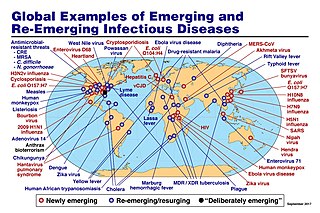Related Research Articles

Bioterrorism is terrorism involving the intentional release or dissemination of biological agents. These agents are bacteria, viruses, insects, fungi, and/or toxins, and may be in a naturally occurring or a human-modified form, in much the same way as in biological warfare. Further, modern agribusiness is vulnerable to anti-agricultural attacks by terrorists, and such attacks can seriously damage economy as well as consumer confidence. The latter destructive activity is called agrobioterrorism and is a subtype of agro-terrorism.

The Centers for Disease Control and Prevention (CDC) is the national public health agency of the United States. It is a United States federal agency, under the Department of Health and Human Services, and is headquartered in Atlanta, Georgia.

Monkeypox is an infectious viral disease that can occur in humans and some other animals. Symptoms include fever, swollen lymph nodes, and a rash that forms blisters and then crusts over. The time from exposure to onset of symptoms ranges from 5 to 21 days. The duration of symptoms is typically 2 to 4 weeks. There may be mild symptoms, but it may occur without any symptoms being known. The classic presentation of fever and muscle pains, followed by swollen glands, with lesions all at the same stage, has not been found to be common to all outbreaks. Cases may be severe, especially in children, pregnant women or people with suppressed immune systems.

In epidemiology, an outbreak is a sudden increase in occurrences of a disease when cases are in excess of normal expectancy for the location or season. It may affect a small and localized group or impact upon thousands of people across an entire continent. The number of cases varies according to the disease-causing agent, and the size and type of previous and existing exposure to the agent. Outbreaks include epidemics, which term is normally only used for infectious diseases, as well as diseases with an environmental origin, such as a water or foodborne disease. They may affect a region in a country or a group of countries. Pandemics are near-global disease outbreaks when multiple countries around the world are infected.
The Council of State and Territorial Epidemiologists (CSTE) is a 501(c)(6) non-profit organization originally organized in 1955, founded in 1992, and based in Atlanta, Georgia. CSTE works to advance public health policy and workforce capacity for applied public health epidemiologists in all localities, states, and territories in the United States.

Swine influenza is an infection caused by any of several types of swine influenza viruses. Swine influenza virus (SIV) or swine-origin influenza virus (S-OIV) is any strain of the influenza family of viruses that is endemic in pigs. As of 2009, the known SIV strains include influenza C and the subtypes of influenza A known as H1N1, H1N2, H2N1, H3N1, H3N2, and H2N3.
Michael Thomas Osterholm is an American epidemiologist, Regents Professor, and Director of the Center for Infectious Disease Research and Policy at the University of Minnesota.

An emerging infectious disease (EID) is an infectious disease whose incidence has increased recently, and could increase in the near future. The minority that are capable of developing efficient transmission between humans can become major public and global concerns as potential causes of epidemics or pandemics. Their many impacts can be economic and societal, as well as clinical. EIDs have been increasing steadily since at least 1940. For every decade since 1940, there has been a consistent increase in the number of EID events from wildlife-related zoonosis. Human activity is the primary driver of this increase, with loss of biodiversity a leading mechanism.

Waterborne diseases are conditions caused by pathogenic micro-organisms that are transmitted in water. These diseases can be spread while bathing, washing, drinking water, or by eating food exposed to contaminated water. They are a pressing issue in rural areas amongst developing countries all over the world. While diarrhea and vomiting are the most commonly reported symptoms of waterborne illness, other symptoms can include skin, ear, respiratory, or eye problems. Lack of clean water supply, sanitation and hygiene (WASH) are major causes for the spread of waterborne diseases in a community. Therefore, reliable access to clean drinking water and sanitation is the main method to prevent waterborne diseases.

Disease surveillance is an epidemiological practice by which the spread of disease is monitored in order to establish patterns of progression. The main role of disease surveillance is to predict, observe, and minimize the harm caused by outbreak, epidemic, and pandemic situations, as well as increase knowledge about which factors contribute to such circumstances. A key part of modern disease surveillance is the practice of disease case reporting.
The Health Protection Agency (HPA) was a non-departmental public body in the United Kingdom. It was an organisation that was set up by the UK government in 2003 to protect the public in England from threats to their health from infectious diseases and environmental hazards. It did this by providing advice and information to the general public, to health professionals such as doctors and nurses, and to national and local government. There were four HPA centres – at Porton Down in Salisbury, Chilton in Didcot, South Mimms in Hertfordshire, and Colindale in NW London. In addition, the HPA had regional laboratories across England and administrative headquarters in Central London.

Field Epidemiology is the application of epidemiologic methods to unexpected health problems when a rapid on-site investigation is necessary for timely intervention. A more expansive definition is: The practice of Epidemiology in the field. Work is done in communities often as a public health service and as part of government or a closely allied institution. Field epidemiology is how epidemics and outbreaks are investigated, and is used to implement measures to protect and improve the health of the public. Field epidemiologists must deal with unexpected, sometimes urgent problems that demand immediate solution. Its methods are designed to answer specific epidemiologic questions in order to plan, implement, and/or evaluate public health interventions. These studies consider the needs of those who will use the results. The task of a field epidemiologist is not complete until the results of a study have been clearly communicated in a timely manner to those who need to know, and an intervention made to improve the health of the people.
The Center for Infectious Disease Research and Policy (CIDRAP) is a center within the University of Minnesota that focuses on addressing public health preparedness and emerging infectious disease response. It was founded in 2001 by Dr. Michael Osterholm, in order to "prevent illness and death from infectious diseases through epidemiological research and rapid translation of scientific information into real-world practical applications and solutions".

Ali S. Khan is an American practicing physician and former Director of the Office of Public Health Preparedness and Response (PHPR) at the Centers for Disease Control and Prevention. Since July 2014, he has served as Dean of the College of Public Health and Retired Assistant Surgeon General at the University of Nebraska Medical Center in Omaha, Nebraska.
Stephen S. Morse is an American epidemiologist, influenza researcher and specialist on emerging infectious diseases, who has served as an adviser on the epidemiology of infectious diseases and on improving disease early warning systems to numerous government and international organizations. As of 2016, he is Professor of Epidemiology at the Mailman School of Public Health of Columbia University. His seminal book Emerging Viruses (1993) was selected by American Scientist for its list of "100 Top Science Books of the 20th Century".

Robert Ellis Shope was an American virologist, epidemiologist and public health expert, particularly known for his work on arthropod-borne viruses and emerging infectious diseases. He discovered more novel viruses than any person previously, including members of the Arenavirus, Hantavirus, Lyssavirus and Orbivirus genera of RNA viruses. He researched significant human diseases, including dengue, Lassa fever, Rift Valley fever, yellow fever, viral hemorrhagic fevers and Lyme disease. He had an encyclopedic knowledge of viruses, and curated a global reference collection of over 5,000 viral strains. He was the lead author of a groundbreaking report on the threat posed by emerging infectious diseases, and also advised on climate change and bioterrorism.

Stephen C. Redd is a U.S. physician and rear admiral with the U.S. Public Health Service and an Assistant Surgeon General. With over 30 years of public health and executive leadership experience, Redd served as the Director of the Office of Public Health Preparedness and Response at the Centers for Disease Control and Prevention. Previously, he was the Director of the CDC's Influenza Coordination Unit, where he served as the incident commander for the 2009-2010 H1N1 pandemic influenza response.

Health security is a concept that encompasses activities and measures across sovereign boundaries that mitigates public health incidents to ensure the health of populations. It is an evolving paradigm within the fields of international relations and security studies. Proponents of health security posit that all states have a responsibility to protect the health and wellbeing of their populations. Opponents suggest health security impacts civil liberties and the equal distribution of resources.
Laura H. Kahn is a native Californian. She is an author, lecturer, a general internist physician, and a research scholar with the Program on Science and Global Security at the Woodrow Wilson School of Public and International Affairs at Princeton University in New Jersey. She is the Co-Founder, of One Health Initiative. She is an online columnist for the Bulletin of the Atomic Scientists. She is an expert advisor and author in the field of zoonosis. Zoonosis is the study of infectious diseases where cross-species illnesses that are caused by bacteria, viruses, or parasites spread from non-human animals to humans. She is the author of Who's in Charge? Leadership During Epidemics, Bioterror Attacks, and Other Public Health Crises
Ann Marie Kimball is an American physician. She is known for being the pioneer of electronic disease surveillance for infectious disease outbreaks and pandemics. She is currently a Professor Emerita in the Department of Epidemiology at the University of Washington, a Consulting Fellow at the Chatham House Royal Institute of Foreign Affairs, and was a Strategic Consultant in Global Health at the Rockefeller Foundation. Kimball served as a technical and strategic lead for the Bill and Melinda Gates Foundation infectious disease surveillance strategy formation.
References
- ↑ "Homepage". ICEID 2006. CDC. Retrieved 2017-07-19.
- ↑ "International Conference on Emerging Infectious Diseases". Archived from the original on 2006-07-16. Retrieved 2017-07-20.
- ↑ "Birdflu Genetics". Yahoo News. 2013-05-23.
- ↑ Kaye, Donald (2006-05-15). "15 May News". Clinical Infectious Diseases. 42 (10): iii–iv. doi: 10.1086/505163 . ISSN 1058-4838.